International conference on counter-terrorism began its work in Dushanbe
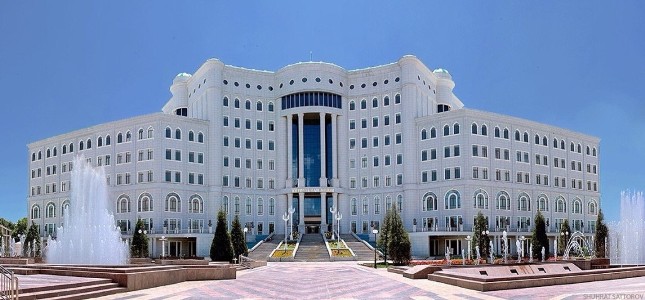
DUSHANBE, 03.05.2018. /NIAT “Khovar”/. A two-day High-level International Conference on «Countering Terrorism and Preventing Violent Extremism» began its work in Dushanbe today.
A statement by the Tajik MFA Information Department indicated that the conference is being held by the Government of Tajikistan in cooperation with the United Nations (UN), the Organization for Security and Cooperation in Europe (OSCE) and the European Union (EU).
The conference participants include heads and senior representatives of foreign ministries and other relevant bodies from 46 countries and senior representatives of international organizations.
Thus, heads and senior representatives of foreign ministries and other relevant bodies of Kazakhstan, Kyrgyzstan, Uzbekistan, Turkmenistan, Hungary, Switzerland, Bahrain, India, Armenia, Russia, China, the United States, Spain, Germany, the Czech Republic, Estonia, Canada, Belgium, Slovakia, Sweden, the United Kingdom, Ukraine, Korea, Japan, Iran, Indonesia, Afghanistan, Turkey, Iraq, Pakistan, Qatar, Morocco, Jordan, Kuwait, Oman, Algeria, Syria, Libya and some other countries are participating in the Conference.
Besides, heads and senior representatives of the UN, the OSCE, the EU, the Collective Security Treaty Organization (CSTO), the CIS, the Shanghai Cooperation Organization (SCO) as well as diplomatic missions, partners for development, civil society and research institutions are also participating in the Conference, said the Tajik MFA information department.
A side event of the High-level International Conference on «Countering Terrorism and Preventing Violent Extremism» is being held in the National Library of Tajikistan titled “The EU Perspective on Preventing and Countering Violent Extremism in Central Asia and beyond”.
The European Union is supporting since 2015 Hedayah, the Center of Excellence for Countering Violent Extremism, with the program STRIVE-Strengthening Resilience to Violent Extremism.
The overall objective of this program is to build the capacity of state and non-state actors to effectively challenge radicalization and recruitment to terrorism while continuing to respect human rights and international law and, more specifically, to work with local partners to design, implement and develop approaches that have a demonstrable impact on the threat posed by radicalization and recruitment to terrorism. The mandate of STRIVE Global Program is global and one of the targeted geographic areas is Central Asia.
This side event will introduce the audience to the “CVE Cycle” (i.e. the different stages in the process of radicalization) and showcase possible CVE responses according to the specific stage. Two specific case studies in Kyrgyzstan will be presented by Hedayah’s local partners: Civil Initiative on Internet Policy and Mutakallim.
Then, participants will learn about Hedayah’s Monitoring, Measurement and Evaluation framework and the new Smart Phone/computer Application, MASAR, a key instrument to design effective interventions, ensuring a measurable impact.
A side event titled “UN Support to Preventing Violent Extremism: Field Experiences” will take place in a mid-day at the National Library of Tajikistan.
According to the Organizers the growing threats of violent extremism and terrorism pose serious risks to the development in the world. Violent extremist groups often reverse the economic and social gains achieved by many countries, and by disseminating the instability undermine efforts of the international community to maintain peace and security, foster sustainable development and promote the respect for human rights.
Violent extremism is a complex phenomenon and in different places of the world is triggered by a unique set of interlinked global, regional and national factors. Choices to join extremist organizations are often individual; however multiple push and pull of factors heavily influence these decisions. The response to extremism threats calls for comprehensive approach, with the scaled-up and effective cooperation between national, regional and international-level actors in framing response strategies that reflect human rights-based measures to address socio-economic, legal and institutional factors contributing to the spread of violent narratives and ideologies.
Evidently, majority of those joining violent extremist organizations are young men and women, but it is important to perceive youth not only as peril and problems, but potential and promise. Multiple consultations and evidence showed that empowered young men and women present a positive force to serve as collaborators and contributors to peace and security and hence sustainable development of their home countries.
The UN-led event is a platform to share the UN experience, products and tools to support countries in preventing violent extremism. The discussion will aim to:
Share evidence from global research on PVE;
Present UN tools, knowledge products, approaches and programmes that support prevention of violent extremism.











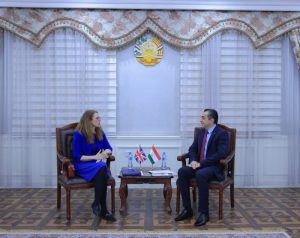 Tajikistan and the UK Explore Ways to Strengthen Political and Economic Cooperation
Tajikistan and the UK Explore Ways to Strengthen Political and Economic Cooperation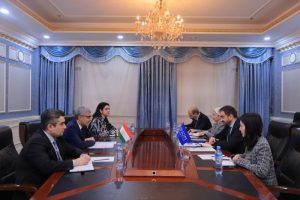 Tajikistan–IOM Cooperation Discussed in Dushanbe
Tajikistan–IOM Cooperation Discussed in Dushanbe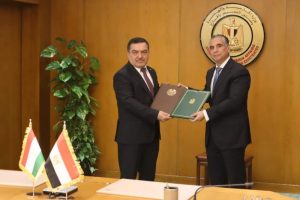 First Consular Consultations Between Tajikistan and Egypt Held in Cairo
First Consular Consultations Between Tajikistan and Egypt Held in Cairo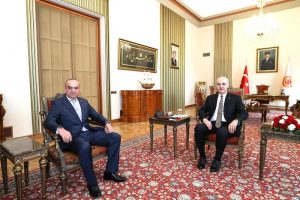 Tajikistan, Turkey Highlight Importance of Expanding Inter-Parliamentary Cooperation
Tajikistan, Turkey Highlight Importance of Expanding Inter-Parliamentary Cooperation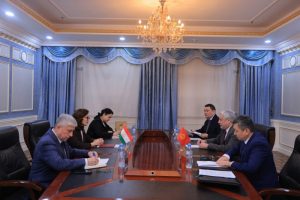 Tajikistan, Kyrgyzstan Discuss Implementation of Bilateral Agreements in Dushanbe
Tajikistan, Kyrgyzstan Discuss Implementation of Bilateral Agreements in Dushanbe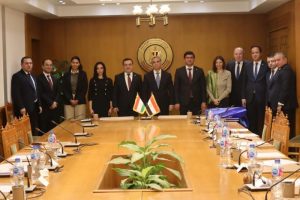 Political Consultations between the Foreign Ministries of Tajikistan and Egypt Held in Cairo
Political Consultations between the Foreign Ministries of Tajikistan and Egypt Held in Cairo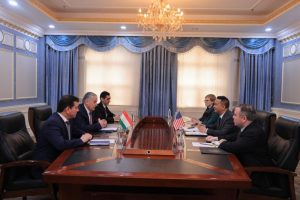 FM Muhriddin meets with U.S Ambassador due to completion of his mission in Tajikistan
FM Muhriddin meets with U.S Ambassador due to completion of his mission in Tajikistan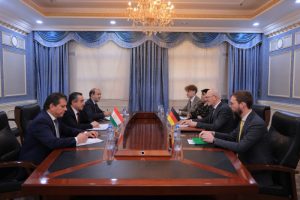 Tajikistan and Germany discuss bilateral cooperation
Tajikistan and Germany discuss bilateral cooperation Joint Statement by the Ministries of Foreign Affairs of the Republic of Tajikistan and the Kingdom of Bahrain on the Occasion of the 30th Anniversary of the Establishment of Diplomatic Relations
Joint Statement by the Ministries of Foreign Affairs of the Republic of Tajikistan and the Kingdom of Bahrain on the Occasion of the 30th Anniversary of the Establishment of Diplomatic Relations New Ambassador of Tajikistan presents copies of his credentials to the head of protocol of the US State Department
New Ambassador of Tajikistan presents copies of his credentials to the head of protocol of the US State Department UN General Assembly adopts Tajikistan’s resolution on International Year of Legal Literacy, 2027
UN General Assembly adopts Tajikistan’s resolution on International Year of Legal Literacy, 2027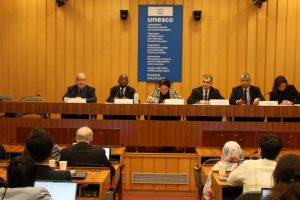 Dushanbe to host International Conference on Water for Sustainable Development in 2026
Dushanbe to host International Conference on Water for Sustainable Development in 2026














